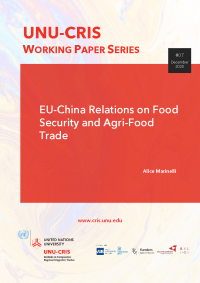EU-China Relations on Food Security and Agri-Food Trade

China, the most populous country in the world, must feed around 1.3 billion people but its agricultural capacities are limited as its borders incorporate only one-tenth of the world’s arable lands. The agricultural sector has been an important driver of China’s economic growth, but due to natural resources’ constraints China has implemented different and sometimes discordant agricultural reforms over the years. Food insecurity in China is exacerbated by the contraction of arable lands, water scarcity and environmental degradation. In accordance with the changing institutional setting and economic environment, food trade policies have varied, although every Chinese government has always prioritized the self-sufficiency principle, which places emphasis on domestic production. Drawing upon theories of international trade, this paper attempts to demonstrate how China would be better off if it increasingly engaged in international food trade and if it enhanced cooperation with the European Union (EU) in research & innovation (R&I) to tackle the problem of food security, as the EU can be a model for sustainable agriculture and food safety for China. European scientific initiatives and the sharing of its best practices have the potential to positively impact on China’s food security status and on the relationship between the two parties in terms of economic gains and of food safety guarantees.
